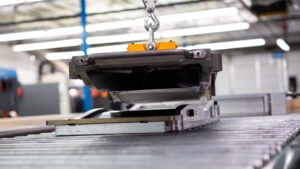When John Groth, founder of Southwest Composite Works, saw how the strength of carbon fiber could be applied to multiple products, he transitioned his company from mold-making for carbon companies to manufacturing the carbon fiber himself. The composite cloth, seven times stronger than steel and half the weight of aluminum, is suited to backpack and bicycle frames, two products the 31-year-old company oriented itself toward early on. Production now takes place in a 15,000-square-foot facility in Albuquerque, where 15 employees work to weave together thousands of thin carbon strands that are adjusted to create unique properties for a range of intended uses.
 Southwest Composite Works was focused on design and prototyping, utilizing its distinct knowledge and tooling equipment on small projects. However, Groth discovered that prototyping, while rewarding, took a fair amount of time and could be chaotic, causing the company to sometimes miss deadlines. At the suggestion of Sandia National Laboratories, Groth turned to New Mexico MEP for help identifying problems and uncovering solutions that might tame the chaos.
Southwest Composite Works was focused on design and prototyping, utilizing its distinct knowledge and tooling equipment on small projects. However, Groth discovered that prototyping, while rewarding, took a fair amount of time and could be chaotic, causing the company to sometimes miss deadlines. At the suggestion of Sandia National Laboratories, Groth turned to New Mexico MEP for help identifying problems and uncovering solutions that might tame the chaos.
New Mexico MEP Innovation Director Scott Bryant first introduced Groth and his team to Value Stream Mapping on the production floor, and a staff member led most of the exercises under Bryant’s supervision. Immediate and dramatic results led the team to push for another project ̶ this one to establish a management structure that would implement lean on both the strategic and tactical levels. Sales, order-taking, and other procedures were addressed through Kanban, Kaizen, 5S, and TPM. More importantly, the company culture was transformed into a lean philosophy rather than haphazard lean applications.
“It was a full pivot,” said Bryant about the company’s transformation. Pivoting from a low-margin prototype facility where only 20 percent of its work was standardized, the company changed into a manufacturing facility whose standardized production makes up at least 80 percent of its work. Southwest Composite Works upended its macro business model to improve not only the workplace and workforce but also the entire company.
Lee Standley, Sales Specialist for the company, said, “We’ve implemented detailed scheduling for processes to improve workflow predictability, conducted in-depth time studies to quantify process steps, and refined workflows to eliminate wasted motion and inefficiencies. These improvements have not only boosted productivity but have also made our processes more structured and easier to manage. The insights I gained from New Mexico MEP continue to shape how we approach efficiency and problem-solving.”
And those insights have reaped results. The company improved its scrap rate to just 2 percent, and took its on-time delivery to more than 95 percent. The Southwest Composite Works team was shocked when it gained 21 full workdays a year by addressing processes related to transport, distances, and motion. The results immeasurably improved employee morale as they increased profitability tenfold.
“Sometimes we forget how powerful this VSM tool is. It looks deceptively simple but it’s powerful,” said Bryant.
Matt Gallegos, Director of Operations, cited just one example. “Prior to our involvement with MEP, our primary product had a processing time of 394 seconds in labor, and since we’ve implemented Lean under MEP’s guidance and consultation, we’ve cut that processing time down to 280 seconds per part,” he said. “That initial impression, that shaving about 114 seconds — less than 2 minutes — seems insignificant, minimal, a pittance. When this 114 seconds is extrapolated out to account for the total annual demand, it results in an astonishing 1,400 hours of saved labor. This is only taking into account one customer and one product!”
“In short,” said Gallegos, “we’ve been a more profitable company with an improved company culture without any increase in revenue via our involvement with NM MEP.”
Learn more about Southwest Composite Works. And call us to learn more about New Mexico MEP’s transformational services.

